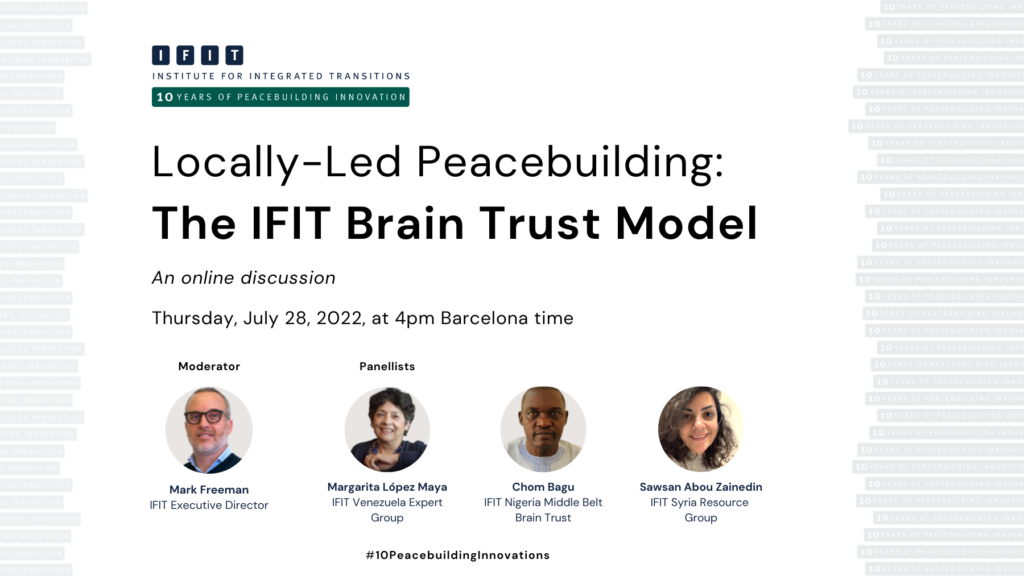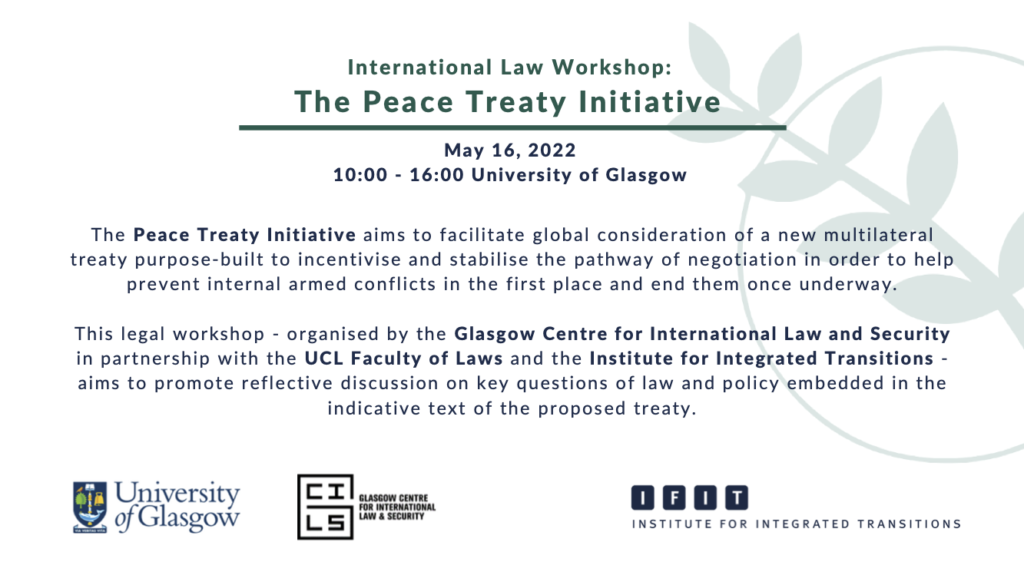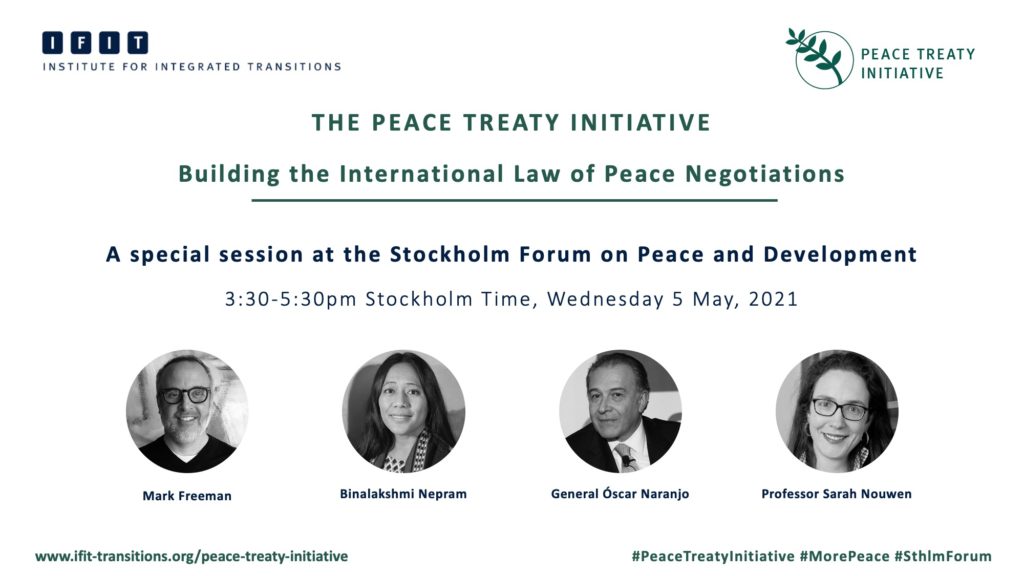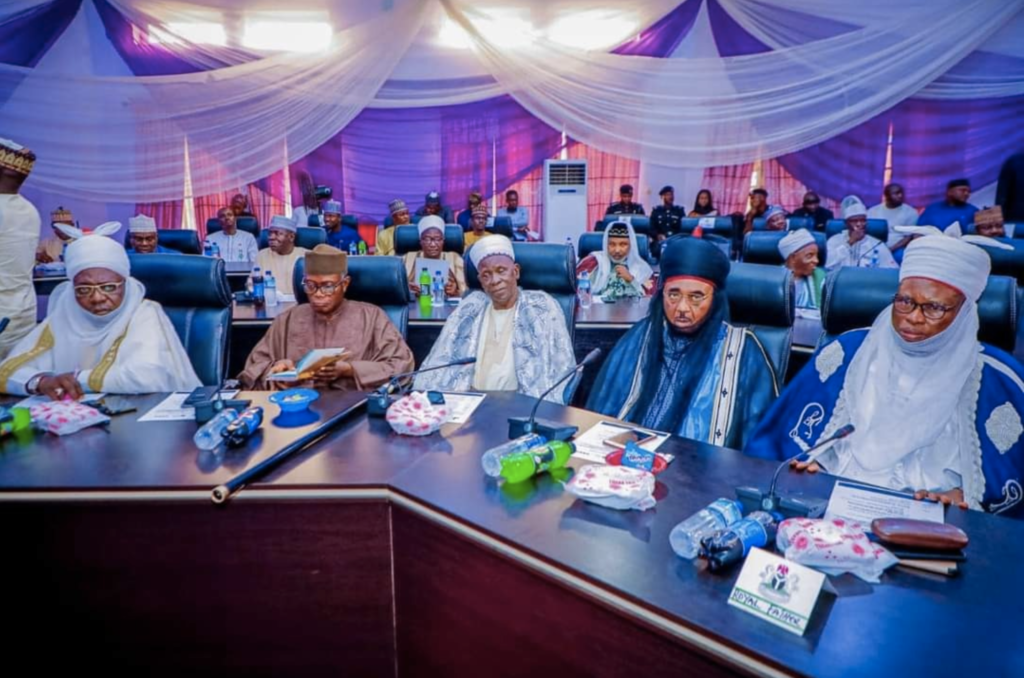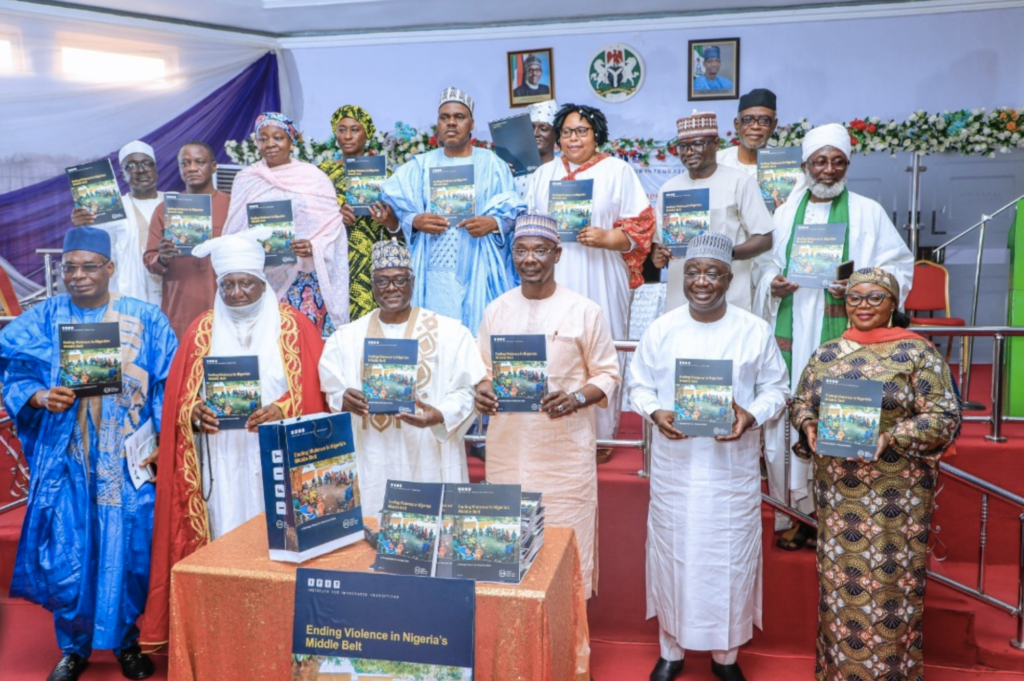Category: Nigeria
IFIT’s Middle Belt Brain Trust (MBBT) has been working on a facilitated negotiation process between the Bassa and Egbura peoples. The negotiations reached a critical stage where the communities and key stakeholders concluded an agreement on all the key issues, including the return of displaced persons and the establishment of chiefdom boundaries. Key stakeholders in government (e.g. Nasarawa State government and security agencies) are all in support of the process and want a quick and peaceful return of displaced persons to their communities.
At the same time, the MBBT is monitoring new risks and has lined up new activities to sustain the momentum.
In other work, the MBBT conducted a conflict sensitivity workshop in January 2025 for Local Government chairmen and their top officials in Plateau State. At the workshop, participants were introduced to tools to help them take deliberate, continuous and systematic approaches that ensure that they minimise the negative effects and maximise the positive effects of their peace policies.
All of this work is part of the MBBT’s larger strategy for the formation of cross-cutting state policies to institutionalise a conflict sensitivity lens in policy making and implementation.
Local media coverage: Daily Trust.
You may also be interested in
IFIT’s Middle Belt Brain Trust (MBBT) held a strategic retreat in Jos, Plateau State in July and also used the opportunity to outreach to the Plateau State Governor. The MBBT informed the State Governor of the group’s collaborative strategy and how its work aims to build on the Middle Belt’s strengths; establish institutionalised mechanisms to manage conflict, strengthen relationships, and build cohesion; bolster existing traditional, social, and state institutions; and increase economic opportunity, especially for youth.
Going forward, the MBBT will remain engaged with the State Governor and will deepen its collaboration with the Plateau State Peacebuilding Agency to pilot and mainstream conflict sensitivity in policymaking and implementation, as well as working to increase youth participation in peacebuilding. Likewise, the State Governor will outreach on behalf of the MBBT to the other State Governors of the region.
Local media coverage: Leadership and New Telegraph Nigeria.
You may also be interested in
On June 13-14, 2023, IFIT’s Middle Belt Brain Trust (MBBT) held a two-day workshop on “Community Grievance Management” for traditional rulers from Benue State. The workshop, in which 21 ‘second class’ chiefs from the Tiv- and Idoma-speaking ethnic groups participated, is part of the MBBT’s broader efforts to improve grievance management capacities at the community level in Nigeria’s Middle Belt region.
The workshop combined discussion of theory and practice, using various scenarios and providing a sense of common purpose and community. Participants discussed community mapping, stakeholder analysis, early warning and response mechanisms, alternative dispute resolution, and ways of strengthening community grievance management councils.
The workshop was one of many MBBT has been holding for traditional leaders (including ward heads, village heads, and district heads). The general aim is to improve access to justice for the region’s disadvantaged, illiterate, rural and dispersed populations as well as reduce the risk that civil disputes turn into violent identity-based conflicts. The broader goal is to increase civic engagement and foster more public processes that over time can facilitate broader social and structural change.
Local media coverage: The Sun – News of the Nation.
You may also be interested in
On 16-17 November 2022, the Benue Working Group of IFIT’s Middle Belt Brain Trust (MBBT) conducted a two-day convening of ‘first and second class’ traditional rulers from Benue State. The aim of the convening was to validate the main findings of the MBBT’s comprehensive research report, Ending Violence in Nigeria’s Middle Belt, and to secure the traditional rulers’ feedback on a proposed grievance management system reform plan.
“As custodians of the customs and culture of the people, we agree with the key findings from the report as the main drivers of conflicts in our communities,” the rulers concluded before listing land administration, youth and rural development, and chiefdoms/traditional administrations as issues of priority in their communities. They also stressed the importance of focusing on cross-border and interrelated conflicts with Nasarawa and Taraba State, explaining that polarisation between communities is increasing in Benue due to divisive narratives and songs pushed forwards by politicians to serve their agendas.
The traditional rulers also agreed on the immediate need for capacity-building in alternative dispute resolution. In addition, they advocated for a constitutionalised role for traditional rulers in community grievance management processes.
You may also be interested in
Between November 9-10 2022, the Nasarawa Working Group of IFIT’s Middle Belt Brain Trust (MBBT) held an in-person convening to analyse the system of land ownership in Nasarawa state.
Organised in collaboration with the Secretary to the State Government’s Office, the meeting gathered together key stakeholders responsible for administering Nasarawa’s formal and informal land holdings. Attendees included traditional rulers; government land administrators from state and local government authority levels (including the Surveyor General, NAGIS, the Ministry of Justice, and land officers); land agents; and representatives from religious communities.
At the convening, participants highlighted potential opportunities and actions that can be taken to improve the land administration process. The group concluded that the most frequent variable as to whether a land ownership conflict will occur is the point at which land held under customary ownership (i.e. informal tenure) is sold to the first buyer.
To further examine the process of purchasing land held under the various types of informal tenure in Nasarawa State, a 10-member project implementing unit was formed. This group will develop recommendations on how to improve land ownership processes, including via record-keeping and verification, as well as how to make the process of obtaining paperwork more accessible and affordable.
You may also be interested in
Photo (left to right): MBBT Chairman General (Rtd) M.L. Agwai; Ene Ode, Country Director, Action Aid; Shane Rice, Irish Embassy; Thomas Jr Bimba, IFIT Local Coordinator in Nigeria; and Matthias Dold, German Embassy.
On 20 September 2022, IFIT’s Middle Belt Brain Trust (MBBT) and the Embassy of Ireland in Abuja held an event to launch the MBBT’s comprehensive strategic report, Ending Violence in Nigeria’s Middle Belt.
Hosted by the Embassy of Ireland, the event was attended by representatives from USAID, the Netherlands, the UK, Finland, Germany, Sweden, Norway, the Norwegian Refugee Council, and TY Danjuma Foundation, among others.
Attendees discussed the rationale behind the selection of the Middle Belt as the focus of the report, as well as the worsening trends – including high levels of violence – that have been affecting the region in recent years. It was highlighted that the problems experienced regionally within the Middle Belt are representative of dynamics in Nigeria as a whole, and that the north-south overlap combined with the area’s significant ethnic diversity make regional security crucial for the entire country.
Going beyond existing literature and understandings, the MBBT’s research concretely demonstrates the multifaceted and multidimensional nature of the conflict in the Middle Belt. It highlights the complexity of reducing violence, but also the important promise of new proposed lines of action across multiple areas.
You may also be interested in
On September 5-6, 2022, the IFIT Middle Belt Brain Trust (MBBT) held a two-day capacity-building training on community grievance management for all the First Class Chiefs of Nasarawa State. The training, which took place at the Ministry of Local Government and Chieftaincy Affairs in Lafia and was organised in collaboration with the Government of Nasarawa State, is part of the MBBT’s wider work to improve grievance management capacities at the community level in the Middle Belt region.
At the training, State Governor Engr Abdullahi Sule stated that the initiative helped promote a culture of peace and harmonious coexistence not only in the Middle Belt, but in the country at large. MBBT Chairman, General Martin Luther-Agwai (rtd.), said that security challenges in the Middle Belt were enormous but with sustained determination and hard work, peace and security would be achieved. He stressed that the failure of existing institutions to manage grievances had become a major conflict driver, as most community-level conflicts that start out as civil disputes escalated to violence and identity conflicts.
The MBBT’s training on alternative dispute resolution mechanisms for traditional leaders (such as ward heads, village heads, and district heads) aims to make grievance management and timely resolution of disputes accessible to disadvantaged, illiterate, rural and dispersed populations, thereby helping to prevent civil disputes from becoming identity conflicts. This effort also aims to increase civic engagement and foster public processes that over time can facilitate broader social and structural change.
Local Media Coverage
You may also be interested in
On Monday September 5, 2022, IFIT’s Nigeria Middle Belt Brain Trust co-organised with the Government of Nasarawa State the official launch of its latest publication, Ending Violence in Nigeria’s Middle Belt: A Strategic Report of Nasarawa State.
At the event, the Executive Governor of Nasarawa State, Engr. Abdullahi Sule, stated that the report “offers a comprehensive picture of the intricate forces causing conflict in Nasarawa State” and that it would “no doubt add to [their] efforts to tackle insecurity through a sustained special attention to matters that border on security and active engagement of all stakeholders”. He assured that the government “would study the report with a view to adopting its recommendations for the benefit of [its] people”.
Based on two years of extensive research and on-the-ground interviews with community members affected by the state’s most important conflicts, the report presents an in-depth analysis of the drivers of violence in Nasarawa State to understand broader dynamics of conflict across the Middle Belt of Nigeria and the spectrum of realistic solutions.
You may also be interested in
On 22nd June 2021, IFIT’s Middle Belt Brain Trust (MBBT) and the Nasarawa State Government co-organised a high-level convening at the Government House Banquet Hall in Lafia. The meeting was attended by key government stakeholders and traditional rulers – including His Excellency the Executive Governor of Nasarawa State, Engr. Abdullahi Sule; and the Emir of Lafia and Chairman of the Nasarawa State Council of Chiefs, Justice Sidi Muhammad Bage I Rtd – as well as civil society organisations.
In a statement at the event, MBBT Chairman General (Rtd) M.L. Agwai outlined the brain trust’s objectives: promoting social cohesion in Nasarawa State through community participation in decision-making; bridging divisions; and addressing community needs. He also reiterated the MBBT’s commitment to support Nasarawa State’s leadership to develop frameworks for a new security architecture, improve state institutions’ dispute resolution mechanisms, and promote local entrepreneurship.
Engr. Abdullahi Sule, Governor of Nasarawa State, expressed his appreciation to the MBBT for choosing Nasarawa State to host the inaugural convening. He commended the MBBT and IFIT for their initiative and announced that his government is working to put in place measures to address the breakdown of law and order, and is open to measures that will promote peace in the state or entrench collective action towards this goal. “This event is in tandem with our collective commitment to bringing lasting solutions to the region’s security challenges, in line with the agenda of President Buhari’s administration,” he said. “Peace and security is a collective responsibility.”
The Emir of Lafia and Chairman of the Nasarawa State Council of Chiefs said, “the MBBT is composed of the very best Nigeria can produce: they are the best we can gather at this point of our national history and we are lucky to have them.”
Civil society leader, Dr. Nawani Aboki, advocated the need for creative ways to kick-start dialogue and for a partnership between government and communities, while stressing that civil society organisations need to be part of the solution..
The Nasarawa State Forum was broadcast on national television.
Local Media Coverage
You may also be interested in
